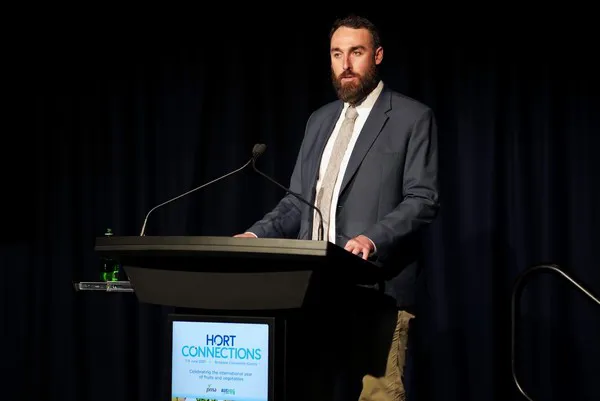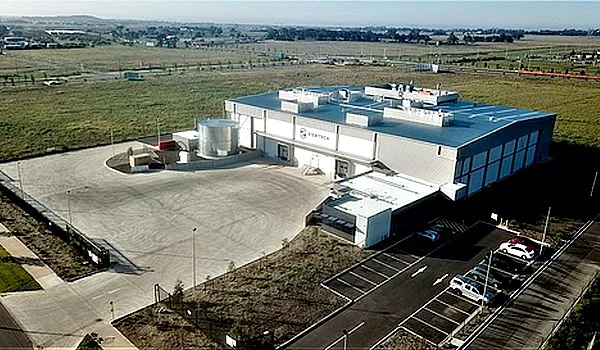Australia's leading phytosanitary irradiation provider has stressed the significance of developing reliable and simple phytosanitary solutions capable of maintaining trade under evolving conditions, to protect Australia's reputation of being a safe and reliable supplier of fruit and vegetables.
Steritech Fresh Produce Business Manager, Ben Reilly noted that it is not always as simple as moving fresh produce "from A to B", as biosecurity challenges continue to evolve as do trade patterns and this requires a well-considered strategy to meet government and industry needs.
"For me, technical requirements such as market access and air cargo security are like the middle of the hourglass. They can limit the potential for existing supply to meet existing demand" he said. "Effective protocols provide Australian growers with secure access to premium markets and help enhance existing competitive advantages such as quality and freshness. For a protocol to be effective it must be developed with a strong understanding for commercial needs otherwise factors such as capacity can limit commercial viability.”'

Mr Reilly added that establishing new market access can take years to negotiate because there is a complex web of challenges and procedures.
"Now more than ever we need to be pursuing simple, secure market access that will be effective in years to come," he said. "It is critical that the industry has flexibility. They need options to ship by air and sea freight. They need solutions that are generic across a broad range of pests. They need sustainable, chemical-free alternatives to effectively meet varied MRL (maximum residue limit) requirements.”
He says cold disinfestation and irradiation are both chemical-free endpoint treatments used in market access, with Steritech's main service being the latter.
"Australia is a leader in utilising phytosanitary irradiation. Australia is now trading with eight countries across numerous crops," Mr Reilly said. "Australia has two specialised fresh produce irradiation facilities, one of which has been operational for almost two decades. Many other countries have not had the same early advantage, but we are seeing this change as food standards and protocols are developed internationally.”

Steritech’s Melbourne phytosanitary irradiation facility was opened in early 2020 and uses X-rays to treat fresh produce shipments, mostly for fruit fly. The X-Ray source runs entirely on electricity with all produce treatments powered by renewable energy, and are destined for both domestic and export markets.
Commercial forces including freshness, quality and sustainability are driving demand for irradiation treatment and the use of the treatment for interstate shipments are safeguarding Australia's domestic biosecurity, which Mr Reilly says is the foundation for export protocols.
"If we keep our domestic biosecurity in order, we have stable conditions limiting the risk of disruption to export protocols," he said. "When we have a failure within our biosecurity system, we see disruption like the recalls that occurred in South Australia this year. The industry is looking for simple, reliable solutions for the future of trade. Developing reliable and sustainable biosecurity solutions help allow industry to invest in growing business. If the protocols we develop today are not effective for new pests of the future or do not meet future chemical and environmental standards then they risk being rendered useless. Another exciting development for industry has been an announcement from Food Standards Australia New Zealand (FSANZ) that approves all fruit and vegetables to utilise irradiation for biosecurity purposes. This was achieved through an application from the Queensland Government, extending upon the 26 crops previously approved."
Mr Reilly also noted that in July, FSANZ expanded its approval to include all remaining fruits and vegetables.
"While it’s long been recognised that the treatment has generic efficacy for insects, this approval was vital in enabling all fruits and vegetables to take advantage of the modern alternative,” he said. “Australian growers now have a domestic biosecurity solution that is effective for almost any insect, in any crop, in any packaging. In addition to this, the treatment is effective at any temperature, protecting the cold chain. Many of Australia’s leading produce brands already use irradiation to service export markets. An increasing number of wholesalers and independent retailers in Australia are also using irradiation to source Australian grown fruit. This has helped those businesses avoid recalls associated with other treatments when they presumably failed. Better for the fruit, better for the environment. The final frontier that we must address urgently is to see Australia’s national retail brands amend company policies that prevent suppliers from utilising irradiation when pest control is required. Irradiation is fully approved and accepted by Australia’s Federal government, state governments and farmers. When retail policies do not allow this sustainable alternative, it is often leaving the farmers with no other viable option than to apply a chemical treatment if they want to supply that particular supermarket. These treatments can have an additional heat component that is damaging to the fruit quality.”
With phytosanitary irradiation already commonly used by New Zealand retail chains, Steritech is quite optimistic for progress in Australia.
"We know Australia’s national retailers are all committed to the quality and sustainability of their fresh produce," he said. "Allowing Australian growers the freedom to choose the best solution for their product, for the environment and for the consumer is surely the right thing to do.”
For more information
Ben Reilly
Steritech
Phone: +61 417 122 230
[email protected]
www.steritech.com.au
